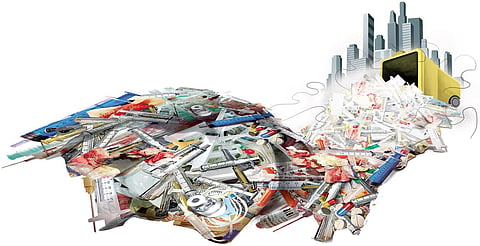The curious case of biomedical waste in Thrissur
THIRUVANANTHAPURAM: Following the Covid outbreak, the number of single-use plastics (SUP) and biomedical waste has increased, thereby reversing years of campaigns and efforts to weed out SUPs from the public milieu. On January 1, 2020, the ban on SUPs was enforced stringently in the district, but the pandemic saw a return of the SUPs. Thanal, the city-based NGO, is planning to look into the issue and quantify the amount of biomedical waste being generated. Thanal will carry out the study in Thrissur.
“The amount of plastic waste that has increased after the pandemic hasn’t been accounted for. We don’t have the correct figures and no control over the data. And it is in this light that we decided to study the issue and compile data on the healthcare waste generated in Covid’s wake,” said Raju S, CEO, Thanal. The study will be held in association with breakfreefromplastic, a global consortium of NGOs.
In line with this, the organisation has identified three areas in Thrissur -- the city localities, Ollur and Kodakara -- for carrying out the study. The study will analyse the waste generated by hospitals, institutions, government bodies, vaccination centres and health centres. “With this, we will get an idea about the healthcare waste generated post Covid and this can be extrapolated to get the statewide data,” said Raju.The month-long study, which is scheduled to start in mid-June, will be conducted at 12 locations -- four each in each of the three selected destinations.
“During the Covid first wave, when use of facemasks increased, there were attempts to replace them with cloth masks. We could reduce the waste generated thus, but now, we are back to square one with the second wave of Covid. We also need to have a clear understanding of the type of materials that comprise the waste generated to understand the feasibility of reusing the refuse,” he said.According to the organisation, the study can be implemented in other places as well. “Once we get the data, it can be extrapolated to get the data in entire Kerala. It can be replicated elsewhere,” Raju added.
Corporation facility
Earlier, during the first wave of the pandemic, the corporation had set up waste collection bags in the offices of health inspectors in the city. The facility still exists and though it is for managing waste at the health circles, it can be used by the public. The waste thus collected is handed over to the Indian Medical Association’s (IMA) IMAGE, the sole biomedical waste treatment and disposal facility in the state.
“The public can dispose of waste such as facemasks, gloves etc by handing it over at these offices. The biomedical waste should be secured in a bag. No other waste should be mixed with it as these are being handed over to IMAGE directly and considering its potent nature, the bag won’t be opened by any staff. So the public should not put any other waste,” said Biju B, health supervisor, corporation.
The return of single-use Plastics
Citing hygiene reasons during Covid, single-use plastics (SUP) like paper cups and plates have made a comeback. “These SUPs are not fully made of paper, but have a wax coating and fall under SUPs. They are being widely used during the pandemic and cause health issues apart from becoming a major concern for waste management,” said Raju. According to the civic body, moves were afoot to pass a bylaw on this when the Covid second wave hit. “Ever since the pandemic, SUPs have made a comeback in the market. The second wave came when we were planning to address the issue.. We plan to seize the SUPs and take action against those violating the law,” said Biju.

